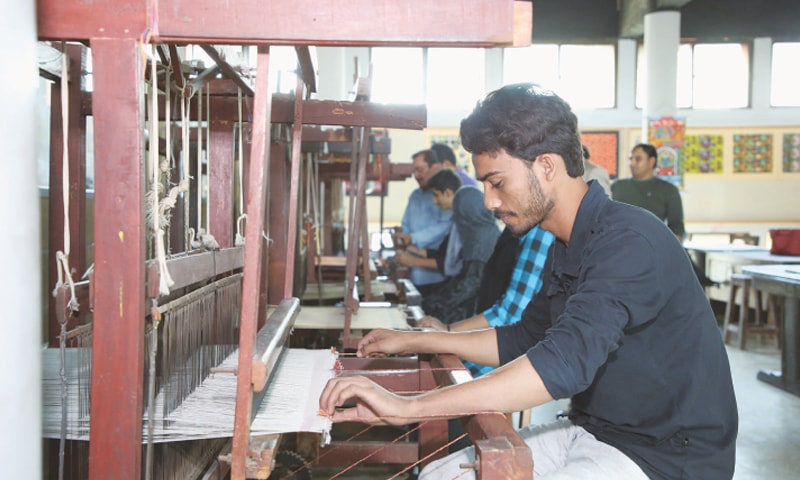
A few years ago, Javed, a young boy from Lyari, became a social media sensation, praised for his detailed and intriguing portraits of international personalities. He is just one of the many gems of talent, most of whom remain undiscovered in Pakistan. However, Javed was later invited to join a new art institute, one that has set out to excavate more like him. He went from working in his father’s paint shop to becoming a future example of what this school has to offer.
The Arts Council Institute of Arts and Crafts (ACIAC) is a revival of the Central Institute of Art and Crafts (CIAC) which was the first institute to offer art education in Karachi after independence. It was built where the Arts Council of Pakistan stands today. Begun in 1964, it has seen the likes of Imran Mir, Naheed Raza and other luminaries walk-through its halls. However, a steady decline was noted in the last 25 years and, soon, other art institutes took centre stage.
In 2017, Shahid Rassam, a Pakistani-Canadian artist and educationist for more than 20 years, came back to Karachi with the dream of reviving this once magnificent school. Coming from a lower-middle class background, Rassam was aware of how classist the professional art world can be. Transforming this mindset by bringing about actual change was his goal.
The revival of the Arts Council Institute of Arts and Crafts aims to make art education accessible across class barriers
Now referred to as ACIAC, the school has rapidly grown in just a couple of years. It has received students from Lyari, Surjani Town, interior Sindh and other less-represented areas. Muhammad Ahmed Shah, president of the Arts Council, played an important role in the ACIAC’s revival. The ACIAC is run by a board of directors, all of whom have contributed tremendously to society.
The school provides scholarships and art supplies to students in need after they pass through a rigorous selection process that includes a talent hunt, a placement test and interview. With the help and active support of generous people, more than 200 scholarships are currently being provided to students.

The school teaches fine art subjects such as drawing, painting, sculpture, communication and graphic design, calligraphy, miniature and photography. It also has a strong focus on music and the performing arts and all subjects are taught by the most qualified instructors in their fields. In theory, history and philosophy of art, critical analysis, English language and Urdu literature are also taught. Learning the national language allows the new generation to understand their country’s culture and strength, while being proficient in a global language — English — empowers them to be successful globally.
Along with Javed, another success of the ACIAC is Raza Haider who created an artificial hand that was able to be operated through a sensor. He is now working for one of the biggest firms in Karachi. Alumni from each department of the ACIAC have a chance at a successful career because they are being given the opportunity of a holistic education.
However, real improvement cannot come until the wall between classes is broken. Attempts are being made at the ACIAC to begin a student exchange programme with other art institutes of Pakistan to overcome the ingrained prejudice against practitioners from less privileged backgrounds, and eventually to achieve an environment that cuts across class barriers. The ultimate dream is to build a top-class institute for art and performance, as well as to increase the number of students.

In a country with a rich art heritage, it is imperative that institutes such as the ACIAC grow so that a strong art education can be provided to all segments of society. Providing an affordable art education allows families usually reluctant to see their children go into the arts field to realise its importance and relevance. Whatever benefits this may also bring to the country’s economy and education level, there is little doubt about its social importance and impact.
Published in Dawn, EOS, June 9th, 2019















































Dear visitor, the comments section is undergoing an overhaul and will return soon.